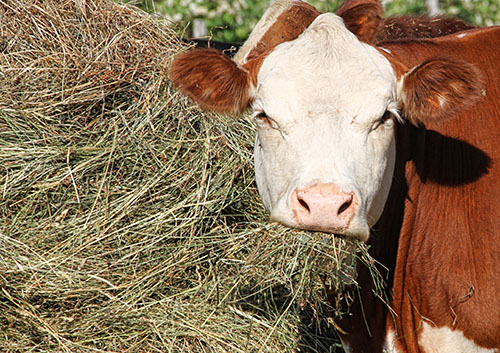Cattle Supplementation
Jan 03, 2022

As we supplement cattle throughout the winter season, an appreciation of nutritive needs required is core to economical production. If cattle simply need to be maintained or if weight gain is desired, nutrient requirements will vary. Everything starts with forage, both quantity and quality.
It is important to test and evaluate forage to understand & estimate the amount of nutrients needed to meet the animal’s requirement. And, subsequently estimate what feed is needed to make up any shortfall. When forage quality is low, overall forage intake will also be low. Factors such as type of forage (grass, legume, etc.) and maturity (as forages grow and mature, forage digestibility declines) affect the quality. On most of our operations, energy and protein are needed in the largest quantity. Data related to maintaining cattle weight does show positive results of increasing protein to aid the animal’s ability to consume and digest more forage. However, most forage offered provide protein diminishing responses to exclusive protein supplementation only. For the most part, only in times extremely poor forage quality will protein only supplements elicit gains. Generally, energy and protein will be necessary, especially with lactating cows. The most cost-effective supplements may not be based on protein concentration.
There are many different types of supplements available to producers based not only on nutrition but also on labor needs. Many free-choice, unlimited access products aid when it is difficult to feed animals daily. It is critical to evaluate labels of all products/commodities/ingredients to make the best purchasing decision. Look for recommended feeding rates. Some protein supplements may have both protein & energy but cattle may not be able to consume enough to matter. Where forage is limited, the percentage of the diet made up of the supplement will be higher thus, some self-regulating products that allow for only ½ lb. per day intake may not provide enough nutrition.
It is necessary for all stages of production to plan for a desired level of performance. Forage is the vital portion when choosing supplementation to meet the goals. Co-op feed representatives are specialists in evaluating the proper feeding strategies for all stages of production.
For more content like this, check out the latest issue of the Cooperator.
It is important to test and evaluate forage to understand & estimate the amount of nutrients needed to meet the animal’s requirement. And, subsequently estimate what feed is needed to make up any shortfall. When forage quality is low, overall forage intake will also be low. Factors such as type of forage (grass, legume, etc.) and maturity (as forages grow and mature, forage digestibility declines) affect the quality. On most of our operations, energy and protein are needed in the largest quantity. Data related to maintaining cattle weight does show positive results of increasing protein to aid the animal’s ability to consume and digest more forage. However, most forage offered provide protein diminishing responses to exclusive protein supplementation only. For the most part, only in times extremely poor forage quality will protein only supplements elicit gains. Generally, energy and protein will be necessary, especially with lactating cows. The most cost-effective supplements may not be based on protein concentration.
There are many different types of supplements available to producers based not only on nutrition but also on labor needs. Many free-choice, unlimited access products aid when it is difficult to feed animals daily. It is critical to evaluate labels of all products/commodities/ingredients to make the best purchasing decision. Look for recommended feeding rates. Some protein supplements may have both protein & energy but cattle may not be able to consume enough to matter. Where forage is limited, the percentage of the diet made up of the supplement will be higher thus, some self-regulating products that allow for only ½ lb. per day intake may not provide enough nutrition.
It is necessary for all stages of production to plan for a desired level of performance. Forage is the vital portion when choosing supplementation to meet the goals. Co-op feed representatives are specialists in evaluating the proper feeding strategies for all stages of production.
For more content like this, check out the latest issue of the Cooperator.